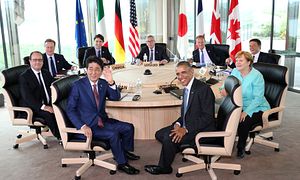During April and May this year, a turbulent time for the international community, Japan initiated some aggressive diplomatic outreach to other developed economies. The efforts included the G7 Foreign Ministers’ Meeting, Prime Minister Shinzo Abe’s visit to Europe, the G7 Summit and related ministerial meetings, and U.S. President Barack Obama’s visit to Hiroshima.
The key focus for the G7 was create a more flexible world order, one able to accommodate emerging economies, without dispensing with it altogether. The main challenges included issues related to the global economy, the world political order, global security, and the maritime order.
Ahead of an Upper House election in July, however, the Abe administration in Japan had its own domestic agenda. Abenomics is about to hit a wall, and the economy has still been unable to recover from the negative economic effects of the 2014 consumption tax hike, from 5 percent to 8 percent. If the consumption tax rate were to be increased to 10 percent, as originally planned, the economic fallout would be even more apparent. For this reason, the Abe administration attempted to gain favor for a postponing of the consumption tax hike while putting together a large-scale supplementary budget, stressing the slowing global economy in his diplomacy with developed economies.
While the administration failed to gain voter support for Abenomics and other economic policies, events such as Obama’s visit to Hiroshima helped the government justify its appeal with diplomacy. The presidential visit also offered an opportunity for Foreign Minister Fumio Kishida, a potential future prime minister, to gain voter support in his home electorate.
Overall, the diplomatic efforts did produce some results. The Hiroshima visit and the related ceremonies successfully reinforced for domestic and international audiences the image of Japan as a peaceful nation, while underscoring the strength of U.S.-Japan ties. The visits sent a powerful message on nuclear weapons at a time of growing criticism of the functions of the Non-Proliferation Treaty structure. Foreign Minister Kishida effectively drew the world’s attention to Hiroshima.
Less successful were Abe’s efforts on the global economy, and his push for the present global economic situation to be recognized as being similar to that before the global financial crisis did not win the support of other G7 leaders. Moreover, while the leaders reaffirmed sanctions against Russia at the G7 Ise-Shima Summit – sparking considerable outrage in Moscow – Abe had little to offer. Russian President Vladimir Putin is in fact expected to visit Japan.
The “G7 Foreign Ministers’ Statement on Maritime Security” was meanwhile issued in April and the subsequent Summit discussed China’s maritime policies. The G7 Ise-Shima Leaders’ Declaration stated, “We are concerned about the situation in the East and South China Seas, and emphasize the fundamental importance of peaceful management and settlement of disputes.” However, the statements never mentioned China itself, although Beijing vigorously protested these statements. Even during the Summit, China maintained that the G7 was an outdated framework and that the G20 was the world’s primary force for change.
The Abe administration’s latest round of diplomatic efforts have been shaped by domestic politics to an unusual degree. Although the initiatives did achieve some considerable progress, they fell short of their original goals. Moving into its fourth year, the challenges confronting the Abe administration are mounting as the problems with Abenomics become clearer. Abe’s diplomacy has been reasonably effective, but going forward they are likely to be increasingly vulnerable to the political situation within Japan.
Shin Kawashima is a professor at the University of Tokyo.
































